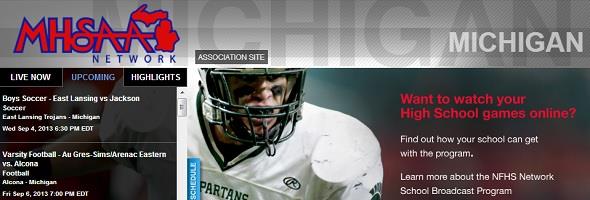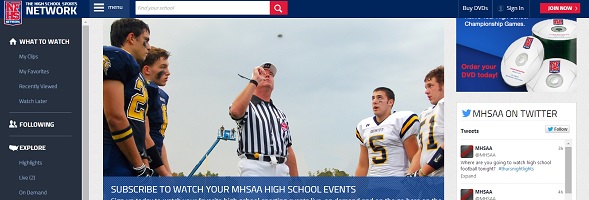
MHSAA.TV March Hits Midpoint
February 24, 2014
Nearly 300 hours of live streaming video from MHSAA Championships in Girls Competitive Cheer and Individual Wrestling, plus Student Broadcast Program produced coverage of Girls Basketball Districts and Ice Hockey Regionals, will be available on the MHSAA.TV website as the March of Winter approaches its midway point.
The coverage begins Monday with School Broadcast Programs providing on demand coverage of Girls Basketball Districts and Ice Hockey Regionals, plus the last week of the regular season in Boys Basketball. Check the MHSAA.TV website for daily schedule updates.
Live streaming this week begins at 2 p.m. on Thursday (Feb. 27) from The Palace of Auburn Hills at the Individual Wrestling Finals. A dedicated camera will be on each of 12 mats on the floor, and include full graphics to indicate the participants in each match, plus full in-progress scoring information via Trackwrestling. Girls Competitive Cheer coverage begins Friday from The DeltaPlex in Grand Rapids.
The continued Wrestling and full Cheer coverage is part of six straight weekends of live MHSAA Championship coverage on MHSAA.TV and online viewers can catch every weekend of action for one low cost of $14.95. A Month Pass on MHSAA.TV for $14.95 will give a viewer access to events over a 30-day period from the time it is purchased. Over the next three weekends of live winter championship coverage, the following events will be featured:
- · Ice Hockey Semifinals & Finals – March 6-8
- · Girls Gymnastics Finals – March 7-8
- · Lower Peninsula Boys Swimming & Diving Finals – March 8
- · Girls Basketball Semifinals – March 13-14
- · Boys Basketball Semifinals – March 20-21
A Day Pass is available for $9.95. All events will be available for free on-demand viewing by Wednesday the week following their initial live airing.
Catch up on some of the final regular-season games for both girls basketball and hockey on MHSAA.TV as those sports move on to postseason competition this week.
Here's a look at all listings from last week, followed by this week's MHSAA Perspective and MHSAA.TV highlight clips.
- East Lansing vs. St. Johns
- Lakeview vs. White Cloud
- AuGres-Sims vs. Posen
- Central Lake vs. Indian River Inland Lakes
- Cedar Springs vs. Greenville
- Davison vs. Flint Hamady
- Comstock Park vs. Grand Rapids Covenant Christian
- Plainwell vs. Coloma
- Central Lake vs. Ellsworth
- Montrose vs. Saginaw Arts & Sciences
Hockey
- Midland vs. Hemlock/Saginaw Swan Valley
- Detroit Catholic Central vs. Warren DeLaSalle
- Bloomfield Hills Cranbrook-Kingswood vs. Trenton
- Boys Basketball
- East Lansing vs. Grand Ledge
- Cedar Springs vs. Greenville
- Cheboygan vs. Gaylord
- AuGres-Sims vs. Hillman
- Central Lake vs. Ellsworth
- Watervliet vs. Lawrence
- Montrose vs. Saginaw Arts & Sciences
- Petoskey vs. Alpena
- Escanaba vs. Gladstone
MHSAA Perspective: In this week's edition, John Johnson talks about those games that are supposedly decided on their last play - The Last Play

This Week on MHSAA.TV
September 9, 2014
A number of Week 2 football games were played over two days during a stormy weekend across the Lower Peninsula. But 14 games from that slate featuring teams from both peninsulas can be watched on-demand in one sitting on MHSAA.tv.
Read on for a list of recent events currently available on-demand MHSAA.tv, followed by this week's MHSAA Perspective and MHSAA.tv Highlights.
Football
- East Lansing vs. Grand Haven
- Montrose vs. Corunna
- Davison vs. Saginaw
- Chesaning vs. Hemlock
- Lowell vs. Chicago Hubbard (IL)
- Lincoln Alcona vs. AuGres-Sims
- Escanaba vs. Traverse City Central
- Calumet vs. Negaunee
- Rogers City vs. Rudyard
- Whittemore-Prescott vs. Oscoda
- Hillman vs. East Jordan
- Lakeview vs. Houghton Lake
- Posen vs. Rapid River
- Comstock Park vs. Wyoming
Boys Soccer
- Cedar Springs vs. Ada Forest Hills Eastern
- Cedar Springs vs. East Grand Rapids
- Montrose vs. Durand
Volleyball
- Chesaning vs. Hemlock
- Calumet vs. Iron River West Iron County
MHSAA Perspective: In this week's edition, our John Johnson talks about how specialization contributes to decreased participation, more injuries and increased parental pressure - Exposing Specialization
MHSAA.tv Highlights: This week's package includes clips from the Corunna/Montrose, Traverse City Central/Escanaba, Posen/Rapid River and Rudyard/Rogers City football games. (See below.)

